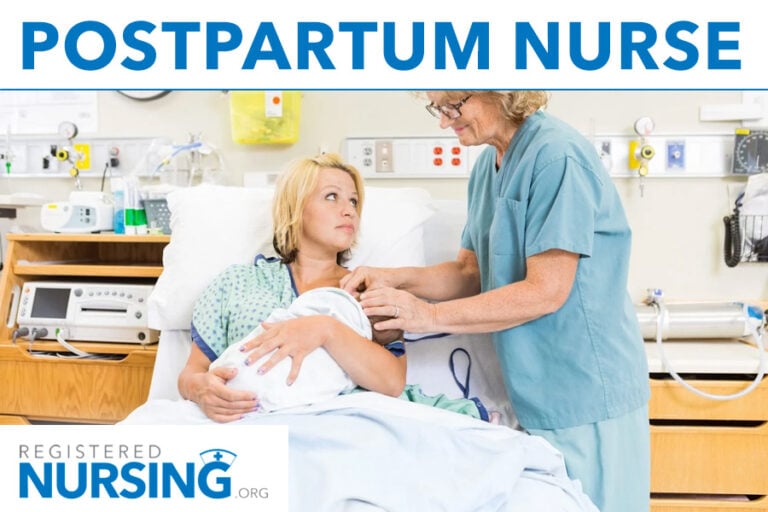Postpartum Nurse (Mother-Baby)

What is a Postpartum/Mother-Baby Nurse?
The postpartum or mother-baby nurse is tasked with caring for both mother and newborn baby once a birth occurs. This nurse utilizes a strong set of skills to recognize and act upon postpartum emergencies for both patients. The postpartum nurse appreciates a busy working environment and the challenge of quickly detecting complications from childbirth. A large part of this nurse’s job is teaching new mothers how to properly care for themselves and their newborns after the delivery. Several types of nurses work with new mothers or in the delivery room. Lactation nurses are often postpartum nurses who have become certified. Here is a table that demonstrates some others:
| Type of Nurse | Role | Education / Licensure / Certifications |
| Certified Nurse Midwife (CNM) | Provides prenatal care, delivers babies, postpartum care | RN, Master’s degree, CNM certification |
| Labor and Delivery Nurse | Cares for mothers during labor and delivery | RN, Advanced Cardiac Life Support (ACLS), Neonatal Resuscitation Program (NRP) certification |
| Postpartum Nurse | Cares for mothers and newborns after delivery | RN, Basic Life Support (BLS), NRP certification |
| NICU (Neonatal) Nurse | Cares for premature and sick newborns | RN, Neonatal Intensive Care Nursing (RNC-NIC) certification |
| Nurse Practitioner | Provides comprehensive care and manages health conditions | RN, Master’s or Doctorate degree, NP certification |
| Clinical Nurse Specialist (CNS) | Provides specialized care, often in neonatal or perinatal care | RN, Master’s or Doctorate degree, CNS certification |
| Obstetric Nurse | Assists with prenatal care and educates mothers | RN, Inpatient Obstetric Nursing (RNC-OB) certification |
| Perinatal Nurse | Cares for women through pregnancy, labor, and postpartum | RN, BLS, Advanced Life Support in Obstetrics (ALSO) certification |
How to Become a Postpartum Nurse
After the nursing student graduates school and becomes licensed as an RN, he/she can apply for a postpartum nursing position. Working in this specialized area is usually available to new graduate RNs but will require training after hire. This is usually accomplished through didactic or textbook learning, as well as working closely with a preceptor to learn how to think critically as a postpartum/mother-baby nurse should. Experienced nurses can also make the switch to postpartum by applying to a hospital or Birthing Center's listing. At most facilities, at least one year of bedside experience is required. Often, nurses who wish to work in labor/delivery are required to start in postpartum before they are eligible to apply.
What Are the Schooling Requirements for Postpartum Nurses?
Both ADN and BSN educated nurses who have graduated from an accredited school are eligible to apply for postpartum nursing positions at most hospitals. Some hospitals require RNs to hold a BSN degree or higher.
Postpartum/mother-baby nurses are required to have an RN license from the state in which he/she will practice nursing. RN licensure can be applied for after meeting the State Board of Nursing's requirements, which consist of earning at least an ADN from an accredited nursing school and passing the NCLEX-RN.
Are Any Certifications or Credentials Needed?
A few certifications are available for postpartum/mother-baby nurses. First, the Electronic Fetal Monitoring certification is a requirement at many hospitals.
The other main certification is the Maternal Newborn Nursing (RNC-MNN). This certification demonstrates expertise and dedication to the specialty. While not required to be hired into the position, this certification is often required by hospitals after some years of employment. It requires 24-months of employment in the specialty.
What Does a Postpartum Nurse Do?
Postpartum nurses provide essential physical and emotional care and recovery for both the new mom and the newborn baby following a delivery. They are trained to educate the new mother and watch for signs of postpartum depression, and may work in tandem with a lactation consultant to assist with breastfeeding. A large part of their role is providing support for the mother in any way that's needed.
Where Do Postpartum Nurses Work?
Postpartum nurses work closely with other medical professionals, including OB-GYN doctors, labor and delivery specialty nurses, nursery nurses, lactation consultants, and more. The postpartum/mother-baby nurse works primarily in the postpartum or maternity unit of a hospital. They can also work in:
- Birthing centers
- Clinics
- Private practices
What Are the Roles and Duties of a Postpartum/Mother-Baby Nurse?
- Assess and monitor the new mother after delivery to ensure proper recovery and healing
- Clean and monitor the newborn baby
- Check vital signs
- Check caesarian incisions if applicable
- Remove catheters after delivery
- Dispense pain medication and/or antibiotics as needed
- Provide education to new parents regarding how to care for an infant
- Help the new mother with the emotional aspects of the birth recovery
- Work with lactation consultants to help the new mother breastfeed
RELATED: You Have The Right To Breastfeed Your Baby [Infographic]
Postpartum Nurse Salary & Employment
A postpartum/mother-baby nurse has a median salary in the US of $137,735. Location, experience, certifications, and education affect the salary. Here’s a full range of yearly salaries that you can expect in this profession:
| Yearly Salary | |
| Lowest Earners | $105,500 |
| Median | $137,735 |
| Top 25% | $151,500 |
| Top 10% | $213,500 |
With no shortage of births in the country, postpartum nursing has a favorable employment outlook. Some nurses gain experience in postpartum nursing and then go on to work as a lactation nurse, labor and delivery nurse, or other maternity specialty, making it a versatile career move. Postpartum/mother-baby nurses must be able to handle working odd hours, as babies are born at all times of the day and night.
Helpful Organizations, Societies, and Agencies
- Association of Women's Health, Obstetric, and Neonatal Nurses
- Childbirth and Postpartum Professional Association
- The American Journal of Maternal/Child Nursing
- Nursing for Women's Health Journal
- Journal of Obstetric, Gynecologic & Neonatal Nursing








